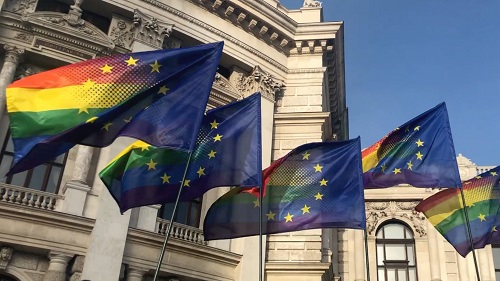Asos Hassan is among thousands of people from the semi-autonomous Kurdish region of northern Iraq who have risked their lives trying to reach Europe this year.
Desperate to escape economic hardship and political repression, the 28-year-old university graduate from Koya, a town located east of the capital Erbil, has twice tried to cross the Aegean Sea to Greece, but was deported by Turkish authorities.
Despite the failed attempts, he plans to return to Turkey and keep trying until he reaches his destination.
“I will keep at it even if I get deported dozens of times,” said Hassan. “I’d rather die than continue living this miserable life,” he added, explaining he has struggled to find employment for years and feels hopeless about the future.
Like Hassan, Kamaran Aziz, a 21-year-old from Halabja, tried to reach Europe through Belarus but was deported by local authorities when his visa expired last week.
Aziz paid Kurdish smugglers $6,000 to make the journey but instead found himself detained and beaten by Belarusian border police before they forced him home. Aziz told Al Jazeera he would rather die trying again than stay in the Kurdish region.
Many of the nearly 30 people who lost their lives trying to cross the English Channel last week were from the Kurdish region.
Iraqi Kurds have also died on the border between Belarus and Poland as hundreds more remain stranded in sub-zero temperatures while trying to cross into the European Union.
These tragic events have highlighted the growing wave of migration out of the Kurdish region and left many wondering why people would undertake such perilous journeys to leave an area rich in oil resources and long hailed as a haven of stability and a model of development for the rest of the country.

Corruption, repression, poverty
Like most Kurdish emigrants, the two young men complained about high unemployment, unpaid salaries, widespread corruption, poor public services, and patronage networks linked to two main families and their political parties that have shared power of the region for decades.
“It’s impossible to find a job unless you’ve connections with the ruling elite,” said Hassan. “And if you try to call for your civil rights or participate in peaceful demonstrations, you just get fired at with live bullets.”
The Kurdish region, which is dominated by the Barzani and Talabani families and their Kurdistan Democratic Party (KDP) and the Patriotic Union Kurdistan (PUK), has seen an increasing number of protests over the past few years.
Thousands of students from Sulaimaniyah took to the streets for several days last month demanding the reinstatement of a monthly stipend that was cut seven years ago. The protests turned violent after riot police confronted the students and used live rounds to disperse the crowds.
Smaller protests spread to other cities in the Kurdish region, including Erbil, Halabja, Kalar and Koya, and solidarity demonstrations took place in Baghdad.
Earlier this year, the United Nations denounced “arbitrary arrests”, unfair trials and “intimidation of journalists, activists and protesters” in the region.

Growing wave of migration
According to Ari Jalal, head of the Sulaymaniyah-based Summit Foundation for Refugees and Displaced Affairs, at least 40,000 Iraqis left the country since the beginning of 2021, 70 percent of whom came from the Kurdish region.
Jalal said migration out of Iraq has been on the rise since the 1990s, but it slowed following the US-led invasion in 2003, before increasing again with the rise of ISIL (ISIS) in 2014.
The Kurdistan Regional Government (KRG) has blamed the growing number of people moving out of the Kurdish region on the influx of internally displaced people from across Iraq after ISIL took over large swaths of the country’s north in 2014, and on decades-long tensions between Turkey and the Kurdistan Workers’ Party (PKK).
The PKK, listed as a terrorist group by much of the international community, has been using Iraq’s northern mountains as a springboard for its rebellion against Turkey. The Turkish army regularly conducts cross-border operations and air attacks against the PKK in northern Iraq.
In a statement last week, Dindar Zebari, KRG coordinator for international advocacy, said the entry of nearly 700,000 internally displaced people into the region from other parts of Iraq has been a source of frustration for Iraqi Kurds, making many “grow a tendency to flee the country”.
He added hundreds of villages in bordering areas where PKK fighters have clashed with Turkey becoming deserted also added to the increase in migration.
“Those who are migrating are telling false stories about living conditions in the Kurdistan Region and are being exploited … to tarnish the region’s reputation,” he told Al Jazeera. He said smugglers looking for material gain were also to blame.
Erbil has worked closely with Baghdad to repatriate hundreds of Kurdish refugees stranded in Europe. It denies forcing its citizens to return.

‘Source of embarrassment’
But analysts said the real reasons behind Kurdish migration were unrelated to the government’s analysis.
“The main problem is the corruption, repression of freedoms and civil liberties, and lack of employment,” said independent Kurdish analyst Mahmood Yaseen Kurdi.
He denied the influx of internally displaced people (IDP) or tensions between Turkey and the PKK, which “affect small villages where only a few hundred people live” were to blame.
“People are growing tired with poverty and unemployment. Even redevelopment has been limited to major cities like Erbil and Sulaimaniyah, but most areas remain poor, looking closer to Sadr City,” he added, referring to one of the most deprived areas in Baghdad.
Karim Nouri, deputy minister of migration and displacement in Iraq’s central government, agreed. “The wave of migration out of the Kurdish region is because young people are finding it difficult to live freely and decently.”
The semi-autonomous region, known for its flashy tower blocks and open green spaces, has regularly been criticised for restricting freedom of expression and, recently, the continuing refugee crisis along the Belarus-Poland border has shed further light on growing corruption, poverty, and financial mismanagement.
According to Sulaymaniyah-based analyst Lawan Othman, the migrant crisis has been a “source of huge embarrassment for the KRG”.
“Whether it’s the migration issue or recent protests, all these events are linked to a wider sense of frustration among Kurdish people,” said Othman.
“They reflect Kurdish people’s disapproval and rejection of their government and how it’s breached their sense of dignity and basic civil rights,” he added.
Source: aljazeera







